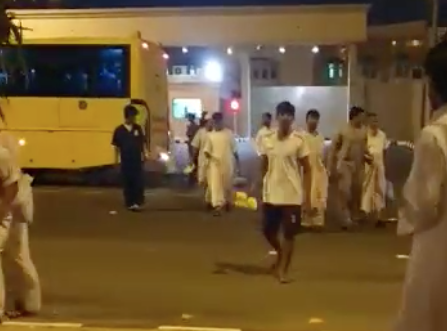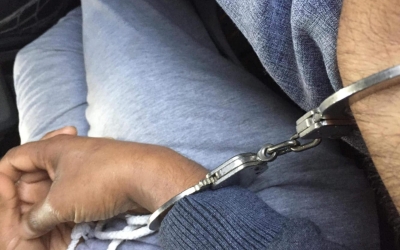Saudi Arabia release 'hundreds' of Rohingya held in detention for years

Saudi Arabia has released hundreds of stateless Rohingya detained in the kingdom for years after they were caught up in Saudi immigration crackdowns against undocumented workers, two detainees and an activist tell Middle East Eye.
Footage sent to MEE showed dozens of Rohingya detainees on Sunday, carrying their belongings in carrier bags, coming out of the Shumaisi detention centre in Jeddah which houses thousands of undocumented workers.
"Look, look, thank God, they are all out," says someone filming in Arabic.
The kingdom has one of the largest populations of the persecuted minority group in the world.
New MEE newsletter: Jerusalem Dispatch
Sign up to get the latest insights and analysis on Israel-Palestine, alongside Turkey Unpacked and other MEE newsletters
Under King Faisal in the 1970s, Rohingya fleeing communal violence inside Myanmar were granted asylum in the country, with residency passing down through generations.
Others came on passports obtained via forged documents after 2011, fleeing riots in Myanmar and looking to earn a living.
But in recent years, hundreds of Rohingya have been detained in raids against undocumented workers from all over the world. While many of the workers held are deported within days, Saudis have chosen to hold Rohingya for long periods, refusing to send them back to Myanmar where they could face persecution.
Rohingya inmates in Shumaisi have said the prolonged detention has left many with mental health conditions and others have died, as MEE has previously reported. Last month, against warnings from the UN, the kingdom deported scores of Rohingya held in Shumaisi to Bangladesh instead of giving them refuge.
Those released over the past week, however, were either born in Saudi Arabia or arrived before 2011 and will be able to stay in the kingdom.
MEE could not independently verify the number of Rohingya detainees released by the Saudi authorities and did not receive a response from Saudi Arabia's embassy in Britain.
'Happy for his brothers'
Meanwhile, detainees like Hussein, a Rohingya who came to Saudi Arabia after 2011 and said he was "happy for his brothers" who were released, remain locked up.
Myanmar's military government, which took power following a coup in 1962, stripped the Rohingya of their citizenship in 1982. This measure forced thousands of Rohingya to obtain passports using forged documents.
Many like Hussein fled persecution in Myanmar and came on passports obtained using forged documents. After 2011, Saudi Arabia started collecting the fingerprints of visitors who entered the country.
So Rohingyas who entered on fake passports were now registered, with their fingerprints, from countries like India, Pakistan and Nepal from which they did not come - and countries which would refuse to take them in because they are Rohingya.
"Those of us who have had our fingerprints registered on Bangladeshi, Nepalese or Indian passports are still inside the Shumaisi detention centre," Hussein told MEE by phone.
"But the people, who come from the Barmawee community [the Rohingya community inside Saudi Arabia], and had been born and raised here have been released."
Another detainee, who refused to give his name for security reasons, said that detainees had been released over the course of nearly a week in a process that made Rohingya like him anxious.
"Since last Wednesday, Rohingya had begun to be released bit by bit," the detainee, who is being imprisoned in a separate wing from Hussein, told MEE, also by phone.
"The situation has made us very tense because we have no way of knowing whether Saudi Arabia will release us next."
Nay San Lwin, a Rohingya activist based in Europe, also confirmed to MEE that Saudi Arabia had only released detainees who were born in the kingdom or came to the country before 2011.
"These Rohingya were released because the Saudi authorities could not match the detainee's fingerprints to a passport on their system," Lwin told MEE.
"But Rohingya detainees, registered on a passport obtained from forged documents at various Saudi entry points, are still in the detention centre and told that they would not be released."
Lwin called on the Saudi government to release Rohingya "who have been in the detention centre for five to six years".
"Saudi Arabia is a kingdom of humanity and can prove this by releasing these men," said Lwin.
"These men have had to endure the mental torture of hearing about the suffering of loved ones in Myanmar who have survived genocide and now live in the camps in Bangladesh."
Middle East Eye delivers independent and unrivalled coverage and analysis of the Middle East, North Africa and beyond. To learn more about republishing this content and the associated fees, please fill out this form. More about MEE can be found here.


